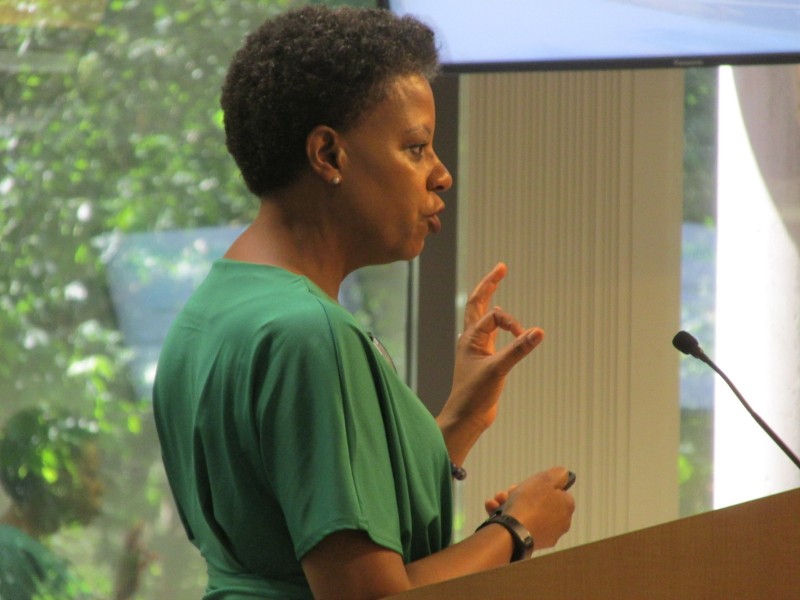GAINESVILLE – The future of public transportation in Gainesville and Hall County will look different in the next decade according to Phillippa Lewis Moss, Director of Gainesville-Hall County Community Services, and she has a preference about how it evolves.
Moss addressed members of the Policy Committee of the Gainesville-Hall Metropolitan Planning Organization (GHMPO) Tuesday morning.
Six months ago a study was commissioned by the GHMPO to examine the feasibility of using shared on-demand transit, or micro-transit, as a part of the county’s mass transit strategy. The reason for the study was that the 2020 U.S. Census will show the county’s population has topped the 200,000 mark and that statistic will change the county’s federal funding classification.
Moss said the county’s current population already places them in the new category for federal funding but it won’t be officially in place until after the 2020 Census is completed. “Because of the certainty that we know our federal funds will decline…we need to start thinking about what we do…we don’t want to wait until the moment gets here and then be in a panic.”
That study has been completed and Moss appeared before the GHMPO to share the findings.
“In a nutshell micro-transit is just a fancy word for the new technology, such as Uber and Lyft,” Moss explained. “It’s basically focused on a very sophisticated software that’s based on an algorithm that can tell you where people are in a community, anticipate where they want to go and position vehicles such that they can connect the two.”
Moss said the study revealed numerous options for Hall Area Transit, from totally replacing county-provided transportation such as Gainesville Connection and Dial-A-Ride and using private sector services, to replacing portions of the above mentioned transit providers and adding private sector partners in partnership, to simply purchasing the technology and overseeing transportation services in-house.
Moss said her department was pursuing all options and requesting bids from several vendors for the different scenarios. “We hope to have as many proposals back from as companies as possible by August, late summer.”
Moss, however, confided that she favored the third option. “We actually lease their software, using our vehicles, our drivers, our facilities; we just use this really great technology that will have us pretty much able to do the same thing they do.”
“That’s where I think the keys to the kingdom are,” she said. “I think if we have access to the technology, and we have our drivers that we know and we trust…and then we have our vehicles which we know…”would lead to the best possible results.
“The benefit of us leasing (software only) gives a sense of security, that so long as we have the software we can operate the system for as little or for as long as possible.”
Moss said whatever option Hall County ultimately choses, “We probably want to put in some fail-proof system to test the program out for six months, look at the measurements and see if we’re still happy with it.”
Policy Committee members Danny Dunagan, Mayor of Gainesville, and Stan Brown, City Manager for Oakwood, said they preferred outside companies providing all services. “I’m with Mayor Dunagan,” Brown said, “I think if there’s a way to do it in the private sector, and it relieves us of some costs, why not look at that as a pilot and see it that works.”
Hall County Commission Chairman Richard Higgins, also a voting member of the GHMPO Policy Committee, supported Moss’s position, favoring software acquisition only. “Recently Uber and Lyft are both having labor problems, and some half-way strikes...it’s something to consider. You’re kind of at their mercy; if you have your own people that you know you’re better off.”
Moss added, “Another of the benefits of keeping the service in-house and still using the technology, we know our drivers. As you know there have been some issues with regards to security and safety in some of these vehicles. We see our drivers every day; we know who they are; we look them in the eyes; there’s a comfort level there for me.”
TWO ADDITIONAL VOTING MEMBERS TO JOIN POLICY COMMITTEE
Despite opposition from two members on the Policy Committee, a split 3-2 vote will add two more voting members to their number.
Gainesville Mayor Danny Dunagan, Hall County Commission Chairman Richard Higgins and Jackson County Commission Chairman Ralph Richardson, Jr. voted in favor of adding both Hall County Commission District 1 and District 4 Commissioners to the voting roster.
Oakwood Mayor Lamar Scroggs (via City Manager Stan Brown filling in for him) and Flowery Branch Mayor Mike Miller opposed the increase. Georgia DOT Representative Charles Robinson, also a voting member, abstained from the decision.
Presently Kathy Cooper holds the District 1 seat and Jeff Stowe holds the District 4 seat. They will be added to the GHMPO Policy Committee at its next meeting on July 30th.

http://accesswdun.com/article/2019/5/794718/what-to-do-about-future-hall-county-mass-transit-still-being-debated
